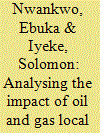| Srl | Item |
| 1 |
ID:
183610


|
|
|
|
|
| Summary/Abstract |
In order to optimise the benefits of oil and gas resources, Local Content Regulations (LCRs) have escalated in the last 15 years among oil-rich economies. In Nigeria, the Nigerian Oil and Gas Industry Content Development Act (NOGICDA) gives the Nigerian Content Development and Monitoring Board (NCDMB) the rights to drive policies and set targets for the growth of Nigerian Content (also known as local content) in the oil and gas industry. Despite the increased in-country engineering capacity observed as result of NOGICDA, the non-disclosure of basic details of contracts in the oil and gas industry creates difficulties in accessing local content contribution to Nigeria's Gross Domestic Product (GDP). Thus, a simple model based on in-country spends is proposed for the estimation of change in GDP as result of increased contracts to Nigerian companies. This proposed model is used to estimate the impact of Shell Companies in Nigeria (SCiN) spend on local contractors since 2010. The study is limited to SCiN since it has consistently published the total value of contract awarded to Nigerian companies since 2010. A yearly contribution of $5.6 billion to Nigeria’ GDP is estimated as a result the contracts awarded to Nigerian companies by SCiN.
|
|
|
|
|
|
|
|
|
|
|
|
|
|
|
|
| 2 |
ID:
125629


|
|
|
|
|
| Publication |
2013.
|
| Summary/Abstract |
Industrial action, organised attacks, and the fighting among the armed groups the government relies on for security have severely reduced Libya's oil production. Richard Cochrane assesses the near term effects of these recurrent problems.
|
|
|
|
|
|
|
|
|
|
|
|
|
|
|
|
| 3 |
ID:
131364


|
|
|
|
|
| Publication |
2014.
|
| Summary/Abstract |
Defence offsets are elements of defence procurement deals additional to the primary content. Offsets are usually expected to yield technological or industrial benefits to the purchasing country (e.g. countertrade, technology transfers, or additional jobs) and military buyers often require suppliers to make offsets available "cost-free." The authors argued previously that such strategies achieve little of value to buyers that lack market power and are unnecessary otherwise, since purchasers with the market power to extract more value for money from foreign suppliers can do so anyway. This article also focuses on the supply side of offset deals. The USA is the world's largest defence offsets supplier but the US government opposes offsets demands as economically inefficient and trade distorting. Even if offsets are inefficient and trade distorting, they may still benefit a materiel-exporting country such as the USA as they may induce exports and create associated benefits for the offsets provider.
|
|
|
|
|
|
|
|
|
|
|
|
|
|
|
|